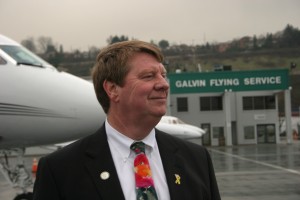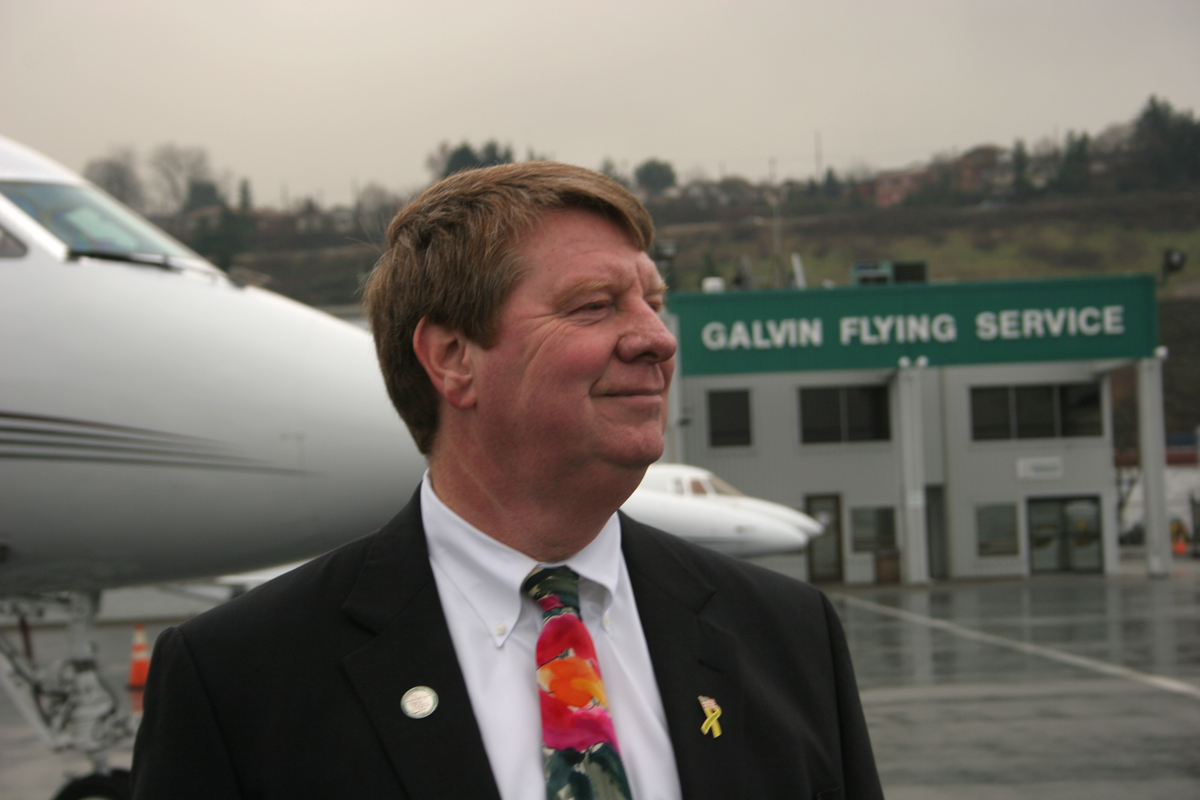
Peter Anderson, president of Galvin Flying Services, sees expanded facilities, programs and growth with new owner Quantem FBO Services.
By Terry Stephens
Galvin Flying Services, based at King County International Airport (BFI), has begun work on a major expansion, just months after the 78-year-old family-owned business was sold for an undisclosed price to Quantem FBO Services in Manchester, N.H.
A 175,000-square-foot redevelopment project will upgrade an existing Galvin hangar and create new hangars on the 11.5-acre site, along with a new shop and office space near the company’s executive jet terminal and flight school. A leading FBO in the Pacific Northwest, Galvin provides aircraft sales, fuel, maintenance, hangar space, pilot training, executive jet services, business charters and aircraft rentals. Galvin reported revenues of about $40 million in 2006.
Peter Anderson, the nephew of Northwest aviation pioneer Jim Galvin, who founded Galvin Flying Services at Boeing Field in 1930, remains as president. He said all employees were kept on staff and that the Galvin name would continue to be used. Galvin operated the business for 50 years, until he retired. Anderson, who had joined the business as an aircraft groomer in 1969 and worked his way up in the company, was promoted to president in 1980.
Under Anderson’s direction, the flying service expanded in many directions, finally outgrowing its space and outpacing its investment capital as it became one of the largest and most successful fixed base operations in the Pacific Northwest. In a recent interview, Anderson said that several months ago, he and his family realized they had taken Galvin as far as they could with their cash resources. That’s when he began looking for an acquisition candidate.
In March 2007, he told Galvin’s 125 employees that he had signed an agreement for an undisclosed price to sell the family business to Quantem, a move that was finalized last October in a venture with private-equity firm WR Capital Partners of Morristown, N.J. Quantem also owns two other family-operated FBOs purchased over the past three years. Quantem executives have said they’re continuing to seek more purchase opportunities for more family-owned FBOs.
“There were growth opportunities in the industry we wanted to take advantage of but couldn’t without tapping into significant new resources,” he said. “And, we knew the buyer would have to be somebody who would start growth and expansion plans immediately.”
That’s exactly what Quantem wanted to do. For Anderson, selling the business after so many years was almost surreal.
“Being an employee for the first time, not an owner, is a whole different world,” Anderson laughed. “Now, I have to ask permission to take off a day or so. But I did take a couple weeks’ vacation for a trip to Bali last fall, after signing a two-year contract. I’m not ready to retire yet and hope to be here for quite a while.”
So far, no major changes in the operation or staffing of Galvin Flying Services have occurred, Anderson said, except that Quantum’s president and CEO, Blake Fish, visits about once a month, and the two have frequent phone conferences to stay in touch, along with email.
“By early May, architectural plans for our expansion were underway, with a groundbreaking set for late January of next year,” he said. “We’re adding what will be a net gain of 100,000 square feet of new hangar space for aircraft as large as a Global Express or a Gulfstream V. The first phase of the project should be available to move into by late September 2009. The second phase will include more new hangars that will enhance our aircraft sales.”
Galvin is the exclusive Pacific Northwest and Hawaiian dealer for Diamond aircraft, planes that are equipped with Garmin G1000 integrated glass panel GPS systems that include features typically found in airliner cockpits. That level of technology enhances flight training for pilots who plan to move into commercial flying. The flight service company also is a factory-authorized service center for Cessna, Hawker, Beechcraft and Columbia aircraft as well as Pratt & Whitney and Honeywell products.
For its extensive flight-training program, Galvin provides a fleet of four-seat Diamond aircraft, including the new twin-turbo, diesel-powered Diamond Twin Star. The company is a leading-edge provider of pilot training in technologically advanced aircraft and simulators. That distinction led to the University of Hawaii selecting Galvin Flying Services to operate its Pacific Aerospace Training Center at Honolulu Community College.
“At Boeing Field, we just added a new $300,000 simulator for the new Diamond Twin Star, and students are thrilled with it,” Anderson said. “We’re fortunate to have such an extensive flight training program for an urban airfield. Typically, it seems that FBOs in large cities will specialize in refueling and maintenance, and sometimes aircraft charters, too. But flight schools are typically outside of the cities. Nationally, only a handful of FBOs with city locations are into the full range of the traditional services.”
Since Jim Galvin began flight training in 1930, Galvin Flying Services has trained more than 17,000 pilots for recreational, business and commercial flying. In recent years, 16 of its flight instructors have earned master instructor ratings. That’s more than any other flight school in the nation, according to Sandy Hill of the 91,000-member National Flight Instructors Association.
Anderson said the multimillion-dollar Quantem expansion also would solve one of Galvin’s weaknesses.
“We’ve been very successful in recent years, and that’s created a shortage of space for customers,” he said. “The Quantem expansion will replace the existing lobby with an entirely new facility more than three times the present size within the next three years.”
He said another recent venture by Galvin is moving into business charter services, offering King Airs, Learjets, Westwinds and Hawkers. He’s also actively seeking to lease Challengers and other owners’ planes for his charter services.
“As terrible and unfortunate as the Sept. 11 attack was, it certainly has heightened a person’s awareness of the need for security and safety,” he said. “That’s been a growing area for us as corporate travelers look for options to commercial airlines. Helping the movement is the fact that five airlines have closed operations in the first quarter of this year, which helped to move people toward executive charter aircraft.”
Anderson’s aviation roles include membership on the founding board of Highline School District’s Aviation High School in Seattle, as well as positions on the King County International Airport Roundtable Committee, the Washington State Aeronautics Advisory Board and the King County Museum of Flight Authority board.











